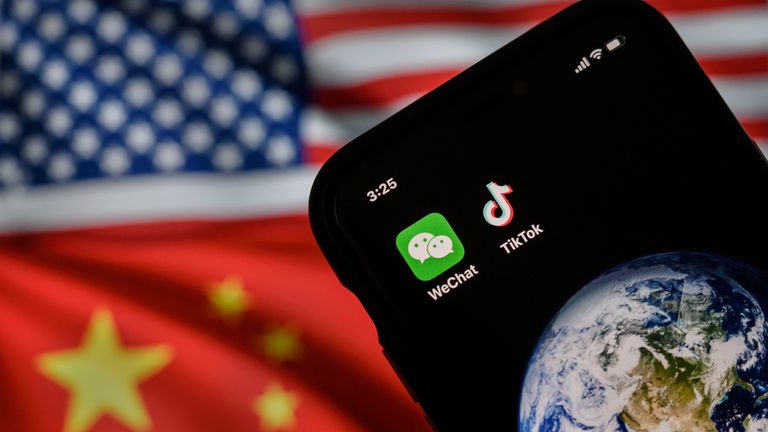TikTok scrambled to delete a video featuring anti-vaccination disinformation during a parliamentary hearing on Thursday, after an MP cited it as evidence the platform was not doing to enough to tackle such claims.
The video features a woman called Olivia Madison - an American influencer who describes herself as "pro life, pro guns, pro Trump" - and has more than 38,000 followers and over 600,000 likes on the platform.
In the video Ms Madison falsely claimed: "Vaccinations contain aborted foetus parts and pig parts. So can you really judge me on being anti-vax? Like I don't believe in injecting a baby with another baby."

Image:TikTok is a social media platform that has exploded in popularity this year
Porcine gelatine, which is made from pork, is used as a stabiliser in some vaccines
as Public Health England explains
: "Unlike the gelatine used in foods, the product used in vaccines is highly purified and broken down into very small molecules called peptides."
It is untrue that "aborted foetus parts" are contained in vaccinations, however some vaccines were first developed in the 1960s using cell strains cultured from aborted foetuses.
Modern vaccine research can use human foetal cells in their development, but these cells are laboratory-grown and not obtained from viable foetuses. This misrepresentation of vaccine development is a common form of purposeful disinformation and
first targeted the Oxford vaccine
, according to fact-checkers Full Fact.
During a select committee hearing in parliament on Thursday, the Scottish National Party MP John Nicholson flagged the video to TikTok's Theo Bertram, stating that Ms Madison was "very beautiful, and what she does is utterly wicked".
"The point I'm making is, if you can't sort out somebody with 606,000 followers, what chances are there that you're going to get rid of the smaller fry?" he added - although the account actually had 606,000 likes rather than followers.
"I mean this woman's just screaming lies as publicly as she possibly can, [in] very professionally produced videos," Mr Nicholson concluded.
Mr Bertram said that TikTok's compliance teams would have to assess whether the video was in breach of its community standards rather than commenting immediately.
Later on during the hearing the committee chair, Julian Knight MP, noted that the video and account appeared to have been deleted.
A spokesperson for TikTok confirmed that, following its mention during the parliamentary hearing, it investigated the account and banned it for multiple violations of the platform's community guidelines.
They said: "Our community guidelines make clear that we do not allow vaccine misinformation on TikTok and we use a combination of technologies and moderators to enforce those guidelines.
"As soon as we were made aware of the potential violations, we investigated the account and banned it," they said, adding: "We encourage any user who observes content that may violate our guidelines to report it to us using the in-app reporting mechanisms."
Social networks including Twitter have faced criticism for outsourcing content moderation to journalistic organisations and users that spend their resources investigating deceptive videos and images instead of the platforms that host them.
Representatives from YouTube and Facebook also attended the hearing, which was held following a study that suggested
a third of people in the UK
have seen conspiracy theories discouraging against getting a coronavirus vaccine.
 简体中文
简体中文





